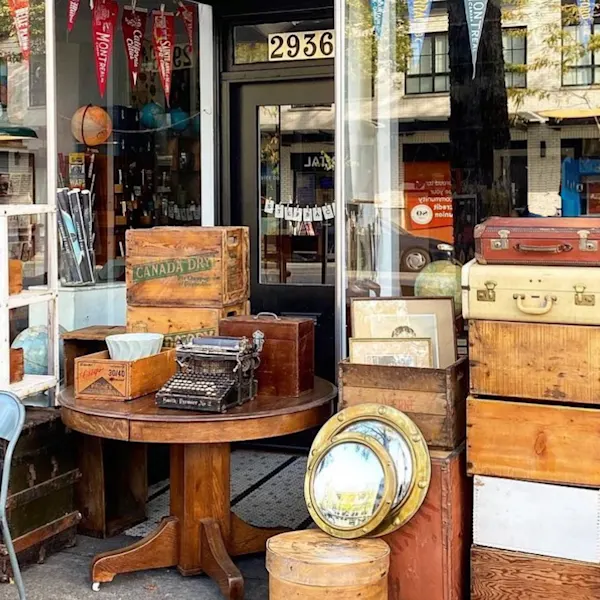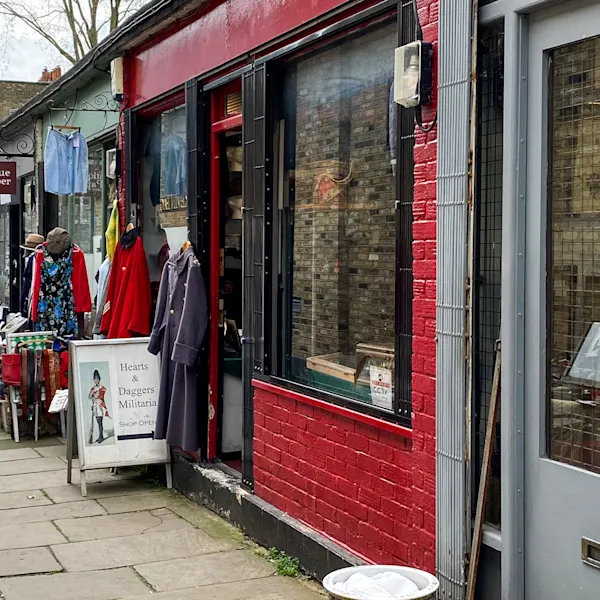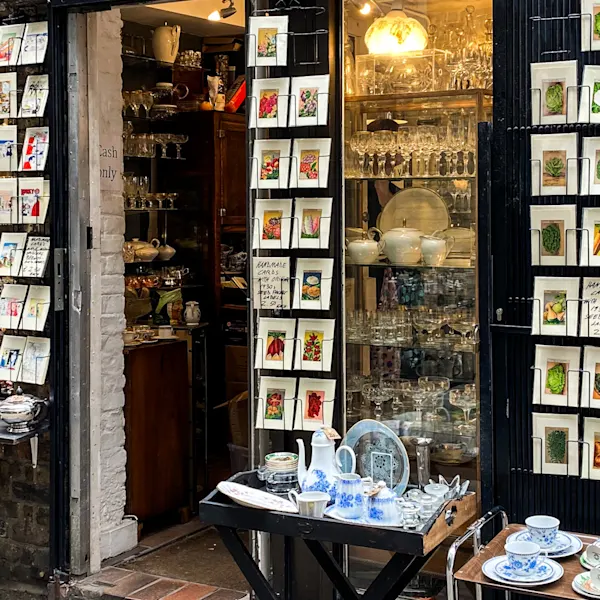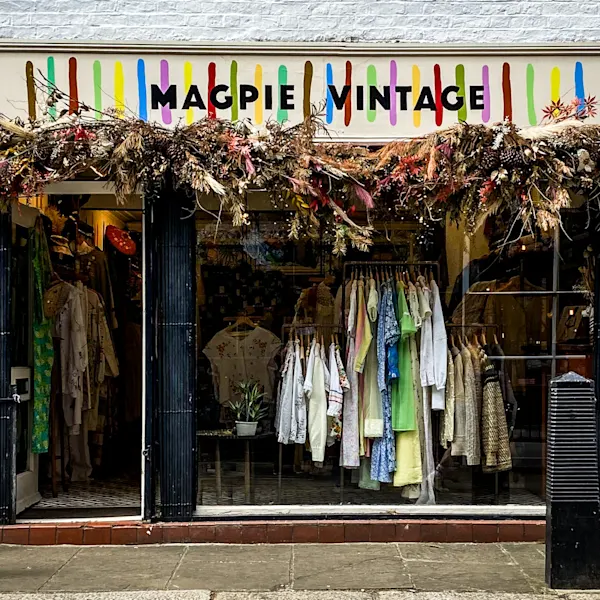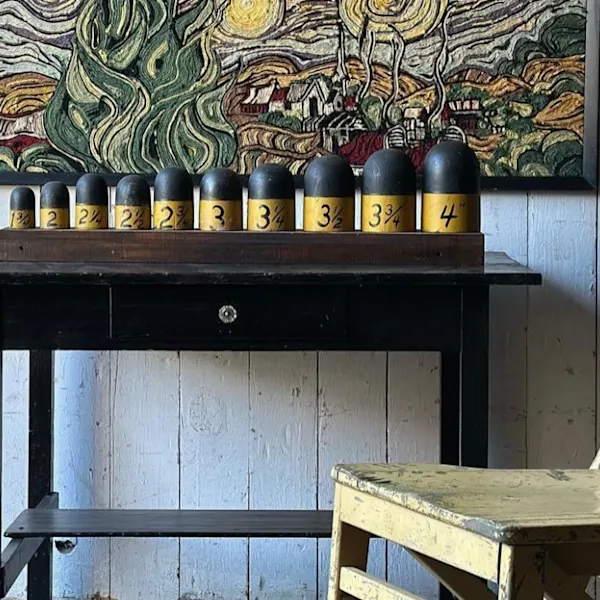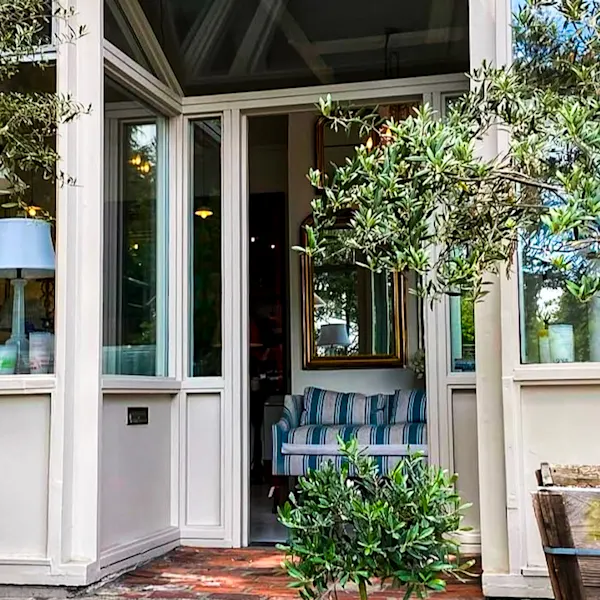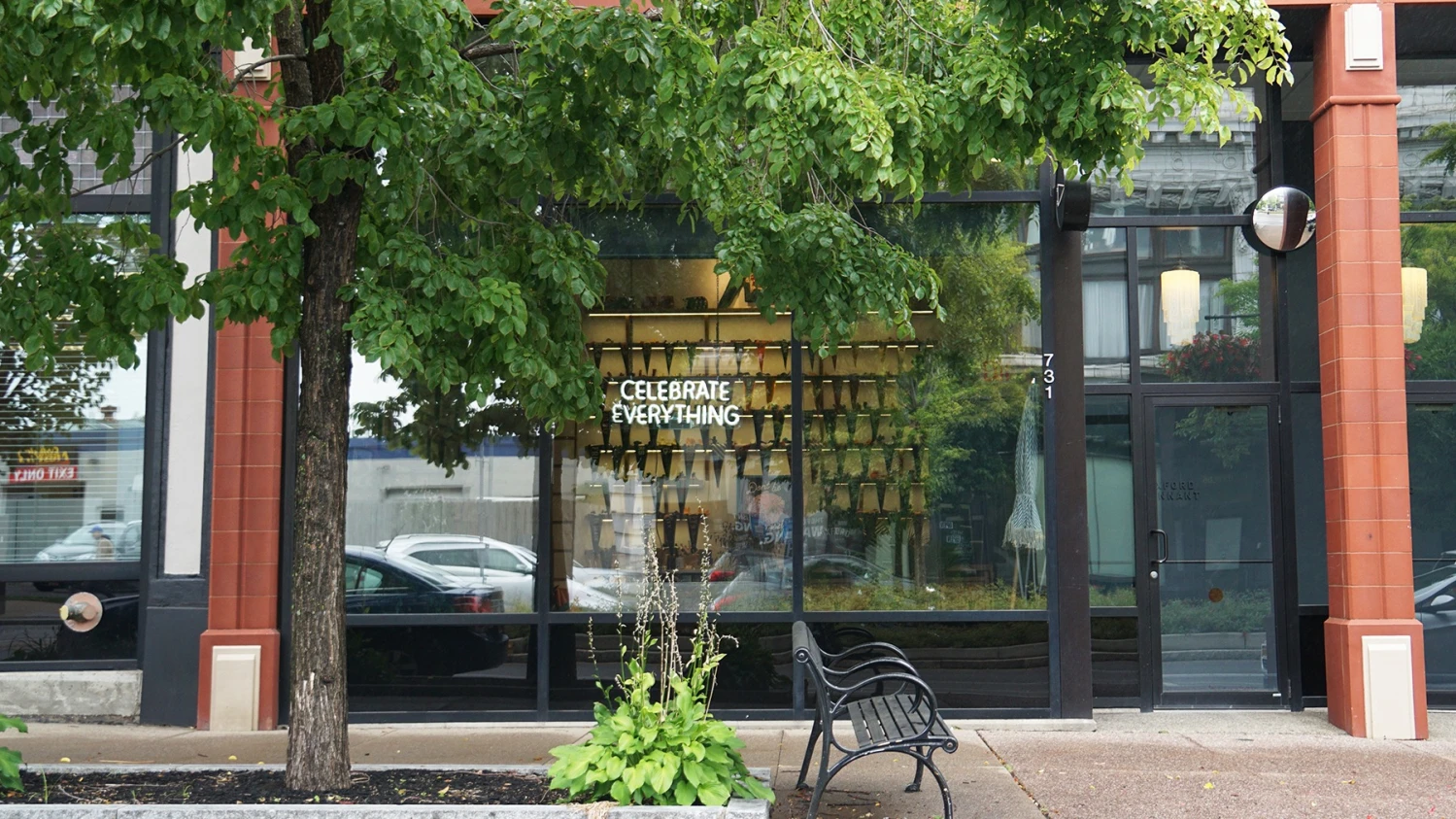
Oxford Pennant
Buffalo Store 731 Main Road, Buffalo 14203, USA
Closed
- Custom wool felt pennants, banners, and camp flags.
- Framed and unframed vintage pennants.
- Original tees, crewnecks, sweatshirts, hats, and kids apparel.
WHAT WE LOVE
The fun and retro charm of a shop dedicated to locally-made old-school wool felt pennants, banners, and flags made to “celebrate everything” life has to offer. Founded in 2013 by Dave Horesh & Brett Mikoll who, building on the success of their brand, opened a shop in 2018 in Downtown Buffalo, New York.
"Celebrate Everything."
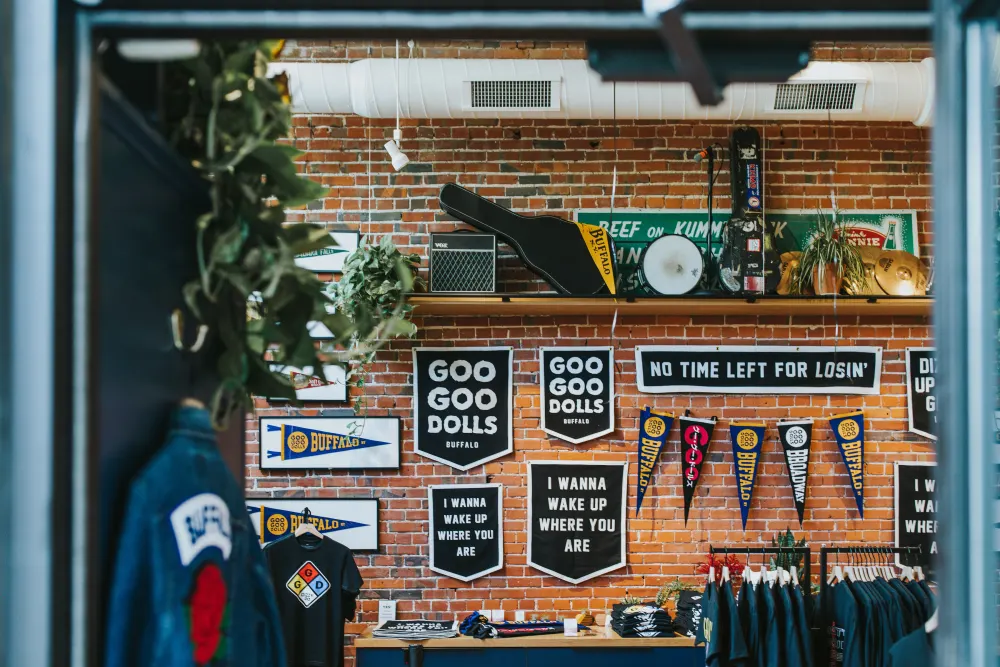
THE SHOP
Back in 2013 Dave Horesh and Brett Mikoll wanted to order some custom vintage-style felt pennants for an event they were hosting, but the only ones that they could find were made overseas from hard, synthetic materials. So they ordered the felt, made their own pennants and posted photos on Instagram. People started reaching out to ask if they could make custom pennants and Oxford Pennant the company was born. Building on the success of the brand, in 2018 Dave and Brett opened Oxford Pennant the shop. Dave shares the story behind the shop, his inspirations, and his favorite places in Buffalo.
Why did you open Oxford Pennant, the shop? Our company has dabbled in pop-up shops for a few years and they’ve all been relatively successful. The downtown core of Buffalo has very few independent retail stores, so we selected an office with retail frontage and hung a wall so that we could set up a permanent shop. The reputation we built with our pop-ups led to a small following that supported us when we opened our doors in 2018.
Did you have prior retail experience? Brett, our co-founder, cut his teeth at Buffalo’s Tony Walker Co. His original job there was designing retail displays, which has served Oxford Pennant well as he’s taken the helm.
Who designed the shop? The shop was designed by Brett Mikoll and Elaine Chow, Adjunct Professor at the University at Buffalo.
What are you famous for? Pennants, flags and banners. We’ve also cultivated a reputation for fun pop-up shops. Our shop concept is based around 1950s athletic specialty shops and we carry an array of vintage products, chenille patches, chainstitched garments and more.
Where do you source and make your products? Oxford Pennant manufactures in the USA and we make a special effort to source from other American vendors. We own a small cut-and-sew facility around the corner from our shop and try to support local, independent businesses whenever we can. In some instances, that’s just not possible. If we source from international vendors, we look for sustainability and honorable business practices.
What makes your shop unique? As far as I know, we’re the only shop in the United States that’s focused on pennants. That said, we also wanted to surprise visitors by creating a beautiful space in a district that isn’t known for retail. Customization is a huge component of what we do and we encourage visitors to explore ways to make our products theirs. We make products for new babies, weddings, retirement parties, anniversaries and much more.
Who are your customers? Our customers tend to be young professionals from Buffalo. Coincidentally, our shop is located in an area with lots of hotels. As visitors explore the area, they tend to stumble in to Oxford Pennant and we’re always happy to welcome them to town. We even developed a small visitors’ guide to share our favorite haunts.
How has the internet impacted your business? Very positively. 90 percent of our business comes from online sales and most of the shop’s inventory is reflected on our site. We decided that the smartest way to build a store in 2019 is to essentially consider it a well-designed warehouse. That’s benefitted us immensely. When a product sells online, we pluck it off the shelf and ship it. I’m convinced that this is one of the only ways to make retail work in a small city.
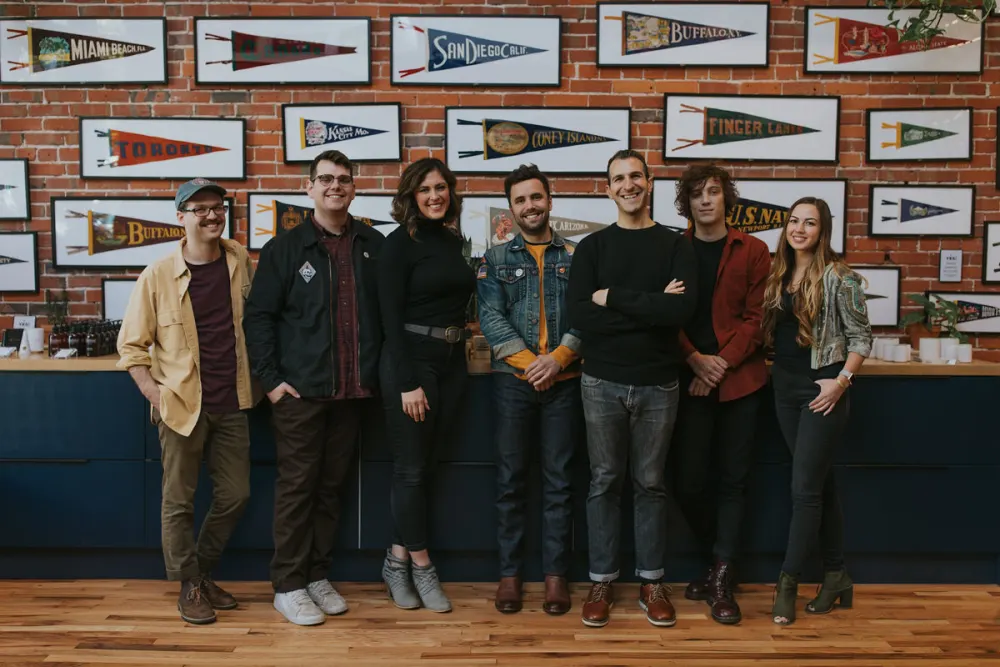
Brett Mikoll & Dave Horesh (pictured center) the shopkeepers at Oxford Pennant.
THE SHOPKEEPERS
Who inspires you? We’re inspired by great shops in big cities. We visit New York often and love shops like Tend Greenpoint, Modern Anthology, Upstate Stock and Camp.
What inspires you? We want to build a business that wears manufacturing on its sleeve and treats employees fairly. We’re inspired by midcentury American manufacturing, especially the human resources components of those companies. We want our employees to be proud of what they make and to earn a good living by being a part of our story. We want our customers to see how much we love that story and how much fun we’re having with our business.
Before I was a shopkeeper, I…. was an outside sales representative for an offset printing company, which gave me a clear sense of the manufacturing supply chain and how to sell customized manufactured products.
The hardest lesson learned in starting a business? Don’t post on Instagram if you’ve been drinking. You’re not as clever as you think you are.
The best lesson you have learned opening a shop? The story always has another chapter. I always find myself immersed in the challenge of the day and once it’s resolved (or not resolved), there’s something waiting behind it. Knowing that there’s always more to do has helped me make peace with the day-to-day anxieties of running a business. Make peace with the predictability of insanity.
Your advice for anyone wanting to open a shop? More channels, more money. Get your items listed online and on as many sites as possible. Find creative ways to put your products in front of people. Every channel you add moves your business’ ceiling a little higher, so make it as high as possible.
If you weren’t a shopkeeper you would be..? I’m an unconventional guy. I’d probably cobble together a living through side hustles. I’d run an Airbnb, sell things on eBay and pick up odd jobs around town.
Do you have five favorite shops? Freeman in Seattle, Chrome Yellow Trading Co , Atlanta; United By Blue , Philadelphia; Bridge and Burn , Portland; Modern Anthology , Brooklyn and one more – Manready Mercantile , Houston.
ON THE FUTURE OF RETAIL
Retail of any type has to be experiential if it’s going to survive. It doesn’t make sense to fill a store with commodity items that people can buy online. Shopkeepers must make sure that customers connect with their brand and that there is something interesting about their store that can’t be replicated online. Most importantly, your shop has to look good on Instagram.
